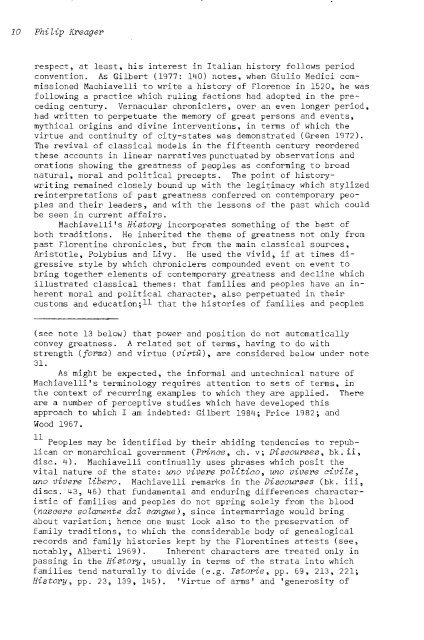CONTENTS NO.I - Institute of Social and Cultural Anthropology ...
CONTENTS NO.I - Institute of Social and Cultural Anthropology ...
CONTENTS NO.I - Institute of Social and Cultural Anthropology ...
Create successful ePaper yourself
Turn your PDF publications into a flip-book with our unique Google optimized e-Paper software.
10 Phi Zip Kreager<br />
respect, at least~ his interest in Italian history follows period<br />
convention. As Gilbert (1977: 140) notes, when Giulio Medici commissioned<br />
Machiavelli to write a history <strong>of</strong> Florence in 1520, he was<br />
following a practice which ruling factions had adopted in the preceding<br />
century. Vernacular chroniclers, over an even longer period,<br />
had written to perpetuate the memory <strong>of</strong> great persons <strong>and</strong> events,<br />
mythical origins <strong>and</strong> divine interventions, in terms <strong>of</strong> which the<br />
virtue <strong>and</strong> continuity <strong>of</strong> was demonstrated (Green 1972).<br />
The revival <strong>of</strong> classical models in the fifteenth century reordered<br />
these accounts in linear narratives punctuated by observations <strong>and</strong><br />
orations showing the greatness <strong>of</strong> peoples as conforming to broad<br />
natural, moral <strong>and</strong> political precepts. The point <strong>of</strong> historywriting<br />
remained closely bound up with the legitimacy which<br />
reinterpretations <strong>of</strong> past greatness conferred on contemporary peo<strong>and</strong><br />
their leaders, <strong>and</strong> with the lessons <strong>of</strong> the past which could<br />
be seen in current affairs.<br />
Machiavelli's History incorporates something <strong>of</strong> the best <strong>of</strong><br />
both traditions. He inherited the theme <strong>of</strong> greatness not only from<br />
past Florentine chronicles, but from the main classical sources,<br />
Aristotle, Polybius <strong>and</strong> Livy. He used the vivid, if at times digressive<br />
style by which chroniclers compounded event on event to<br />
bring together elements <strong>of</strong> contemporary greatness <strong>and</strong> decline which<br />
illustrated classical themes: that families <strong>and</strong> peoples have an inherent<br />
moral <strong>and</strong><br />
character, also perpetuated in their<br />
customs <strong>and</strong> education;ll that the histories <strong>of</strong> families <strong>and</strong><br />
(see note 13 below) that power <strong>and</strong> position do not automatically<br />
convey greatness. A related set <strong>of</strong> terms, having to do with<br />
strength (forza) <strong>and</strong> virtue (virtu), are considered below under note<br />
3l.<br />
As might be expected, the<br />
<strong>and</strong> untechnical nature <strong>of</strong><br />
Machiavelli's terminology requires attention to sets <strong>of</strong> terms, in<br />
the context <strong>of</strong> recurring examples to which they are applied. There<br />
are a number <strong>of</strong> perceptive studies which have developed this<br />
approach to which I am indebted: Gilbert 1984; Price 1982; <strong>and</strong><br />
Wood 1967.<br />
11<br />
may be identified by their abiding tendencies to republican<br />
or monarchical government (Prince, ch. v; Discourses, bk. ii,<br />
disc. 4). Machiavelli continually uses phrases which posit the<br />
vital nature <strong>of</strong> the state: uno vivere poZitico, uno vivere civiZe,<br />
uno vivere Zibero. Machiavelli remarks in the Discourses (bk. iii,<br />
discs. 43, 46) that fundamental <strong>and</strong> enduring differences characteristic<br />
<strong>of</strong> families <strong>and</strong> peoples do not spring solely from the blood<br />
(nascere soZamente daZ sangue) , since<br />
would bring<br />
about variation; hence one must look also to the preservation <strong>of</strong><br />
family traditions, to which the considerable body <strong>of</strong> genealogical<br />
records <strong>and</strong> family histories kept by the Florentines attests (see,<br />
notably, Alberti 1969). Inherent characters are treated only in<br />
passing in the History, usually in terms <strong>of</strong> the strata into which<br />
families tend naturally to divide (e.g. Istorie, pp. 69, 213, 221;<br />
History, pp. 23, 139, 145). 'Virtue <strong>of</strong> arms' <strong>and</strong> 'generosity <strong>of</strong>

















